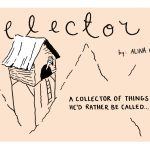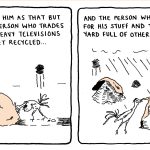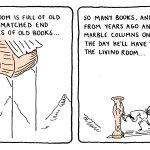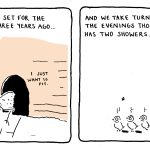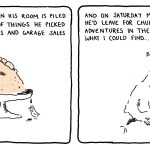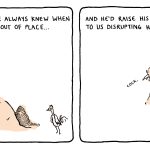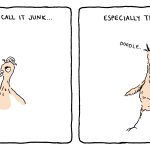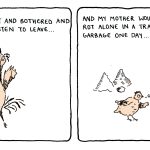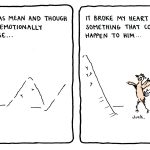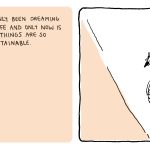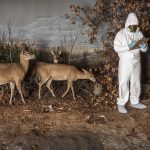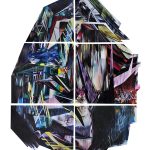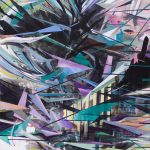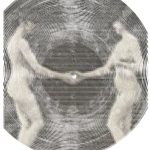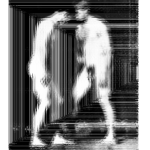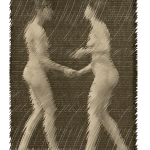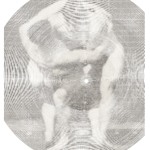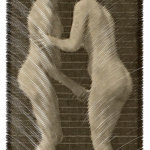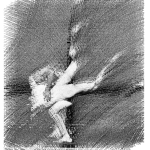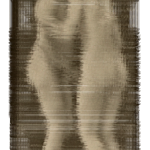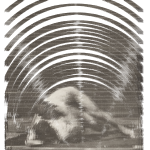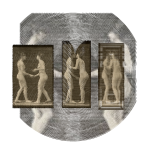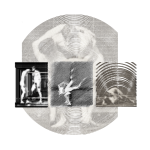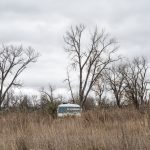Aquifer shares this story in conjunction with
Anna Levi’s visit to UCF on February 4, 2019, 7:30 p.m.,
Foxtail Coffee at the UCF Bookstore.
Please also see our interview with Levi.
This evening when I woke up, Chino was gone. Not a sight of him selling crack on Cow Head Road. There was something different about that morning. The rain came with rage in a vengeful way for the first time in two months. Force-ripe baby breadfruits dropped into the canals whenever the wind struck. Bedsheets slid off the lines straight into the muddy gutter. Some girls were woken up by the growls of the thunder and, one by one, they ran out the rooms with their half-naked selves to save their towels, panties, and bras off the clothing lines.
There were fifteen wooden and rusting galvanized-roof shacks in the yard of the brothel. Each room had a thick mattress on the checkered black-and-white linoleum floor; a small speaker box; a small lattice window; a small round mirrored ceramic face sink; a suitcase; a brass vase of dying red hibiscus flowers in the right corner of the floor; an aerosol spray of floral air-freshener; a roll of toilet paper on a shelf; and burgundy lace curtains all balled up in a knot to allow air to freshen up the rooms. Rainwater leaked through some of the roofs straight onto the mattresses.
Chino’s mother, Sita, property owner of the brothel, who lived in the same yard with us, came over, dragging a large blue tarpaulin, gasping for breath and occasionally spitting on the floor. Chickens ran towards her gluey mucus and they picked at it like grains. She dropped the tarpaulin in front of my bare feet, scratched her grey coolie hair, flickered thick white dandruff from her fingernails into the air, then she placed her left hand on her hip and pointed her right index finger in my face and said, “Look here gyal, just cover de place until this rain dry up and come see me after. Ah tired. Ah gone.”
Already soaked in the rain, I stared at her skinny madras bosie back slowly walking back to her jhoparee. I stared at her jutti pitching mud at the bottom of her yellow saree and I remembered Tasha, my childhood friend from Tacarigua who drowned in a well a day after she turned eight. I could see her in my mind running after a cow straight up to Kandahar Village on a rainy crusade day in August. I could never forget that day Tasha slipped on a blue tarpaulin in Tanty Lalee’s yard and buss her head. I couldn’t bear the memory of the tarpaulin that caused Tasha months of healing, so I took one hard look at it, then I walked away from it.
I grabbed a white pigtail bucket to catch the plopping rainwater that leaked from the edge of the galvanized roof. Water from the pipe was scarce. It came once or twice a week. Sometimes for days, not a drop of water in Chase Village. Chino, our pimp, often told us that the water company deliberately locked off our water supply to put pressure on him to shut down his business.
There were twenty-five of us living in the backyard shacks of the brothel. Three locals including me, and the rest were from Colombia, the Dominican Republic, Venezuela, and Martinique. Two girls had babies including me, and three other women had children. The babies and children all lived with Sita. My baby, Maria, was only nine months old and I didn’t know exactly who was her father. My baby didn’t look anything like me. She was a light-skinned, chubby-legged, Chinese-face, dougla-hair baby, and I was a mocha-skin, skinny girl with Afro hair. I remembered fucking a few men from an offshore company, but I just didn’t know which one was Maria’s father. I didn’t really care about her and sometimes I didn’t believe I had actually kept her. I left it up to Sita to look after her. Sita got money from the child welfare services for all the children she looked after, including mine. She knew how to scam the system.
Every day, some of the girls were transported to other brothels far away in the countryside, depending on their legal status. Most of them either left their babies behind with Sita or found a way to take their children for their family or friends in their home country to look after.
My best friend, Bella, a thirty-two-year-old Dominicana, had been living in the brothel since she was twenty-seven. Bella and I shared a small room at the back of the brothel. During the daytime, we were allowed to go out and make our own money. Bella and I worked two days a week peeling vegetables in a Chinese restaurant in San Fernando. One day a week Bella learnt English, and I had recently started taking maths lessons. The other days Bella, I, and some of the girls hustled on the marina in Chaguaramas, selling our cunts for pounds, US dollars, yen; any money that pass, we didn’t miss. Some of the girls took English lessons some days in the week to keep their legal status, while others took the risk to work in Chinese-owned variety stores. Chino often warned the girls about jobs that put them at risk of deportation. I was lucky because I was a local and could lie to save myself.
From 10:00 p.m. to 4:00 a.m., Chino owned us. Every man we fucked, he took and controlled our money. He fed everyone, sent us shopping whenever he felt like, paid for the girls’ legal status, tickets back and forth to their home country to drop off their babies, court charges. He was our fairy godfather. He had many friends in high places, but he wasn’t an easy man to deal with. He often gave us crack to kick off our night’s work and sometimes he’d beat us like he did the pit-bulls he trained. This is why for a long time, I have been considering running away from this place with or without my baby.
“Sonya, Sonya, where is Chino? Me no see Chino,” Bella inquired. She covered my head with her towel and dried my arms with her top.
“Ah doh care. Ask Sita, she know everything about she son,” I replied.
“You no care? Chino have me passport. If me no have passport, me no go no way?” said Bella, pointing at her chest and shaking her head with concern.
“Whey yuh going, Bella? There is no way tuh go right now. The police busted Copa Cabana, Miramar, and Ocean Spray last week. Yuh want tuh go tuh jail or get deported? Dem women in de jail will fuck yuh harder than ah man and yuh know what? Chino’s friends, dem is prison officers too. They go fuck yuh even harder if they know Chino owns you. Especially how yuh have sunflower eyes and yuh skin so soft and pink and yuh lips so thin and yuh hips so wide, and yuh hair so blonde, straight and long,” I warned her.
“Me no understand you. Chino what? What is da problem? Can you talk slow? You confuse me with Trini talk. You sound like you from Africa. You English is very, very bad!”
“Sita want tuh see meh fuh something Ah doh know yet. Come with meh nah? Maybe she know whey she son gone too,” I said slowly and I grabbed Bella’s hand to take her to Sita.
A long trail of violet periwinkle flowers separated Sita’s house from the brothel. Children who lived in the sawmill next door were sliding their asses in the mud, and some were racing after a bicycle tire around Sita’s jhoparee. Sita’s pothounds never liked me. They rushed me in the rain.
“Los perros think in he mind that you are ah fantasma,” said Bella and she picked up a few pebbles to pelt the dogs.
“Fantasma?” I asked twisting my confused face.
“Yea, it is something like ah dead person you cannot see. Ah! Like ah spirit,” she replied, clicking her fingers.
“Hahahah, that is ah scary way tuh see people,” I said.
“Me abuela would say that you are maldicion. Ah don’t know the word for it in English. But you need ah rosario then go to confesiones. You need to put on white clothing. You spirit, you life will be better. In me country, muchas people Catolicas. Is ah tradition. We love it,” she said waving her hand and smiling with happiness.
“I understand you. But I am not Catholic. The woman who Ah live with was ah Hindu like Sita. We have puja fuh bad spirit. Sita knows,” I replied.
Under the coconut tree in Sita’s yard, an open mandir with a statute of lord Shiva sat with folded legs on a cushioned fake lion. He was adorned as a lady with long golden mala earrings, a golden trishul firm in his left hand, green beaded bracelets around his wrist, a white lingam drawn on his forehead, a charming snake posed off on his bun-styled hair, and another vicious-looking snake around his blue neck. His lips were raspberry red and his fat cheeks were blushed up with rose. He held his right hand against his chest as if he was giving a pledge. I picked up a yellow buttercup flower on the slippery muddy floor, lit a coconut-soaked wick in a deya, and performed aarti, singing a bhajan:
Om Namah Shivaya, Har Har Bhole Namah Shivay,
Rameshwara Shiva Rameshwara, Hara Hara Bole Namah Shivay,
Ganga Dhara Shiva Ganga Dhara, Hara Hara Bole Namah Shivaya
Bella held onto the colored bamboo flags and waited for me in the rain. After I sang the mantra, she hurried me by my arm.
“Listen to me, Sonya,” she said. “Sita is ah bad woman.”
We walked through the rain and then up the few stairs of Sita’s jhoparee.
“No, she ain’t. Yuh should pray. I go teach yuh. He is Lord Shiva, he killing all evil,” I said.
“No! Me is Catolica. Me confess to San Basilio only! You like ah madness. Only think I like is that you God is ah man and he look like ah woman. She pretty lips, rojo. She man and she woman. Me like that. Eso es poder e igualdad para cada género. But snake on she body? Maligna! Sita esta loca! If me hungry? I will never eat from that crazy Sita. Loca. And you Sonya, you crazy too!”
Sita was sitting on a rocking chair feeding Maria sugar-water from a plastic baby bottle. Four children were sitting on the floor eating macaroni and ketchup and licking their fingers. Two boys were jumping from a table to the mattress. Bella took off her white cotton frilled top and beat the flies that buzzed around the children’s meal. Salina the red-eyed cat jumped on me, and I flung her on the balata window frame of the tapia house.
“Meow, meow, meow” Salina cried.
“You see, I know what I talk about. You need change you God,” Bella remonstrated.
Sita handed me Maria in a hurry, and I threw her into the air and kissed her all over her belly. Baby Maria’s skin was smooth like the milk Sita offered Lord Ganesh.
“She has a bad cold,” I said, listening to Maria’s rattling cough as she giggled “Ma ma, ma ma.”
“Ah just squeeze ah lime in she tea,” replied Sita.
“No! give she honey and vaporizer, no lime!” Bella persisted.
One of the children who were eating on the floor, a small boy with a swollen, malnourished belly, stood up to stare at us, chewing his thumb. Sita’s jhoparee contained three small bedrooms with seashell-printed shower curtains as doors, an open kitchen, and a littered living room. The dried grass from the clay-filled walls flew in the air whenever the fan breezed the wall. Lizards ran in and out of holes in the walls to catch spiders. There were a few plastic bottles of water under the kitchen sink. Baby cockroaches clambered out of a Styrofoam box, which contained Sita’s cold-storage food on a table in the center of the living room. Dried corn husks and strips of orange peel hung from the low palm grass ceiling of the jhoparee. The smell of soaked dhal filtered the air as if a sewer had been leaking underneath the house. Black and white photos of old folks and a colored baby photo of Chino licking ice cream on the beach were glued to the wall. A tall brown cardboard barrel with an address in Germany was used as a space saver. An electric kettle, coffee mugs, and Lipton teabags sat on a red-crocheted tablecloth on the top of the barrel. People’s names and addresses and phone numbers were scribbled all over the barrel.
Bella examined the colorful picture of Mother Lakshmi that sat on a pitch-oiled lamp near Sita’s rocking chair. When Sita lit a cigarette, Bella took it from her to finish it.
“Sita, me no see Chino all day. Where is Chino? We no have enough beers in de bar,” said Bella.
“Well this is why Ah wanted tuh see Sonya,” replied Sita and she got out of her rocking chair to make black coffee.
“What is da problem for Chino? This morning me have premonition for Chino. I see in me sonar, ah woman with ah gun. Me no understand that woman. Me never see she in me life. She look like ah Trini. Maybe it is you sister, Sonya. She look just like Sonya. Negra and tall and bonita. Big Afro hair! She and Chino have ah gun. Then me see ah white bird come and Chino go with de bird and I no sleep good after that,” continued Bella propping her head with her hand on Sita’s table.
“Ah doh have any sister, Bella! You make me so angry when yuh talk about family. I’m ah Nowherian. Sita should take you tuh she pundit to unfold yuh dream,” I replied, standing up to rock Maria to sleep.
“Well Ah get ah call from de police station and they say they have Chino in Remand Yard at de jail. They say they find Chino in Carlsen Field with a kilo of cocaine. And he have ah hearing next week Monday in Chaguanas Magistrate Court. And Ah doh have no money. I eh even get meh pension and de children welfare yet,” Sita paused with a worried look and she continued to weep, saying, “Before Chino father dead, he wanted tuh sell de bar inno. Ah shoulda sell de damn bar. But Ah feel sorry for de girls Chino trying tuh help. Yuh know? Chino doh sell coke! Somebody must be jealous of meh son because he used tuh make money from de bar. And these children Ah minding here, Ah get good people to take them, but Chino doh listen tuh nobody. Ah tired tell he tuh stop helping allyuh. Doh take in no more girls! Leh dem go back home tuh Venezuela and Santo Domingo or wherever he pick them up, on de street, Ah doh know! Ah just want back meh son and fuh he tuh change he life. Now he in jail and me eh have no money. Not ah cent. Ah cyah even buy tablet fuh meh diabetic foot. Oh God, they set up meh son. Chino doh trouble nobody.”
“I no understand,” said Bella and she raised her skirt to dry Sita’s tears.
“Chino is in carcel.” I explained to Bella.
“Chino what? I need me passport. I want get ah man to take me away from Rich Gold and he will help me go back to me country,” Bella boasted.
Maria held my neck tight. I felt her little heart pumping on my chest. I looked at myself in a mirror that was nailed to the balata wall frame, and I imaged what my birth mother looked like with me when I was her baby. I have never seen any pictures of myself as a child nor of my mother. I vaguely remember where I got that long deep scar over my eyebrows. It must have been my foster mother. She often beat the shit out of me and that is why I came to Chino.
Nobody told me I was pretty except for Bella. And that is why she is the only girl at the brothel my blood took. A woman who knew my real mother told me I smiled just like her. She also told me that my mother had a deep dimple in her cheek just like me. Some people from Kandahar Village told me that my mother died of pneumonia when I was six months old. Other people told me that my mother gave me away because she was on drugs. I never wanted a baby so young in my life, and I didn’t know if I really loved or wanted Maria. Sometimes I did. But I hated my mother for leaving me in the world like this. And I hated Chino for lying to us about our future. He didn’t care. Maybe my father was like Chino. I would do anything to leave this place.
“So this is what yuh want tuh tell me Sita? How can I help Chino? I can’t!” I replied and I shoved Maria into her hands.
“Ah woman from Rio Claro want tuh buy yuh baby from you. She can’t make babies,” said Sita, putting Maria down on a mattress on the living room floor.
“She buying meh baby? How much money she want tuh give meh?” I asked eagerly.
“How much yuh want?” Sita asked seriously.
Mosquitoes gathered around Maria’s head. Sita placed a net over her body and fanned her with a newspaper. I wondered what my daughter would become if I sold her or if she would be better off living with Sita. I didn’t know what to do with her.
“What yuh think, Bella? Ah doh know if de police go find meh. People everywhere already know ah make baby,” I worriedly asked.
“Just tell them de baby die,” replied Sita, shoving her saree between her legs and fanning Maria faster.
“Sonya, let me make ah confesion. Five years ago, me make baby. You know how I get to know Sita? Somebody bring me here, and Sita sell me baby to ah Trinidad woman who now live in Canada. She say she make baby at home in Trinidad and she get ah passport for de baby. Ah get some money and me baby go Canada with de woman to live. No problem! Baby will have ah better life. Baby will not forget you smell, you eyes, you skin. One day, baby will come back to you. I cry for my baby every day but I happy she is in a better life. Así es la vida. Da police no understand nothing in this country. Only for marijuana and cocaine. That is not police business. Okay? So take de money and give de baby away. You start ah new life. You are ah free woman!”
“Is she going to miss me?” I turned to Sita.
“No! she is going tuh miss me. Not you!” Sita pointed at herself.
“Okay, take my baby! Give de woman ah reasonable price. No!” I quickly changed my mind and declared, “Ah want ten thousand dollars. It’s enough fuh a visa and a ticket tuh start a new life in America.” I fantasized about shopping in America with a rich white man.
“If de woman come fuh Maria tonight, can I borrow de money tuh bail out Chino and he go give it back tuh you?” Sita was serious.
“Tonight? So soon?” I asked.
“Well, after midnight. It better Maria goes while she is asleep. When she get up, she won’t see me and she won’t know how she got there. She won’t remember anything,” Sita replied.
“Ah don’t trust Chino inno. That money is my only dream,” I replied.
“Our dream,” Bella insisted.
“Do you trust me? I’m not Chino!” Sita demanded. Her raccoon eyes looked dangerous, reminding me of the snake around Lord Shiva’s neck. The moles on her face made it look like a sour rough lemon. Her fat nose looked inflamed, red and swollen like Krusty the Clown.
“Take de baby, Sita! Call me when yuh have meh money,” I said and walked out the jhoparee in haste, leaving Bella with Sita.
“Do you want tuh go tuh America? Meh sister living in America inno. She is ah citizen. I can help yuh go tuh America.” Sita’s voice echoed behind me.
Later that night, Gloria and nine of us were sniffing hail, dancing to Yoskar Sarante’s La Noche, and dressing up for our night’s work in the garage.
“Where is Chino?” Gloria enquired, then she offered me a line of candy coca. After sniffing, I wanted to slap Paola for stealing my client when he came looking for me last Friday and she didn’t call me for him. I saw neon green lines walking past the room. I hugged my tattooed chest tightly and dropped my head on Gloria’s shoulder to gasp quietly for breath. My body went numb and for a few minutes I stood silently, thinking of Maria. The smell of Johnson’s baby powder and clean cotton diapers overwhelmed me. I realized that Sita was right. Maria would be better off sold or given away, and I could be a free woman in America.
“Chino always go to jail. He come back out and he gone again,” replied one of the girls as she rolled her fishnet stockings up her burnt legs.
“Me need me passport,” Bella said as she entered the garage.
“We don’t need passport. Me don’t want to go back home. There is nothing for me in Bogota. No more!” shouted Sandra.
“I want go back home. Mi mama sick and me miss me boyfriend. De men here not nice. De culture is loca. Me need freedom. No like work behind de kitchen, no like hide from police. Life no good here. Is ah racist country. Imigracion like money. No money, no extension. In me country we eat carne frita and chicharrones de pollo every day. I eat mucho curry and bbq in Trinidad. Curry everywhere! I need food from my country. From my mother!” said Bella, and she bent down to draw a line of candy coca for her stuffy nose.
The garage was a large secured space, situated beneath the brothel. We kept our personal belongings there. It was also our secret hiding place whenever the police came to raid. It had a gravel-camouflaged electric gate that locked us inside until we were dressed and ready for work at night. Wardrobes, cardboard boxes, plastic containers, and large blue rubbish bags were labeled with our nicknames.
After Betina painted my lips with her dark purple lipstick, she pulled out a pink bralette from her drawer and measured my tits.
“My god, you arm smell like ah ram goat,” she said, to the amusement of the other girls.
Sometimes we shared each other’s clothing, wigs, lace stockings, weaves, high heels, lipsticks, jewelry, and perfumes.
“Give it to me,” shouted Isabella, and she grabbed the bralette from Betina.
“No, yuh greedy bitch,” I replied, and I punched Isabella in the face.
When Isabella scraped my dark smooth face, I wanted to murder her. I pulled off her wig and choked her. Some of the girls screamed when Bella jumped in to help me punch Isabella some more.
Some of Isabella’s friends pulled me off her.
“You nothing but ugly n—! Nobody wants you!” Isabella cursed me.
When Sita heard the smashing sounds of beer bottles on the wall, she ran into the garage with two children holding on tight to the end of her saree.
“Yuh see wha happening here already? Ah fed up. Ah trying meh best tuh raise allyuh children and put dem in good homes and look how allyuh mashing up meh place,” quarreled Sita.
Hidden in the center of some of the mattresses that were spread on the floor, were unused condoms, packets of heroin, cocaine powder, and kush, rubber gloves, needles and syringes, packets of extra strength Panadol, bottles of sleeping pills, antibiotic pills, and an untouched diamond-black 9mm, seventeen-round pistol. Colombian, Venezuelan, and Dominican Republic flags fluttered from the ceiling as the fan recycled the dark eau de toilette air. Artificial silk flowered headwear wreaths, straw hats, and sunglasses adorned the white bald heads of Pinocchio-nose mannequins. Metal filigree masquerade masks, purple carnival beads, and a rosary hung around the neck and on top of the ivory white-veiled head of a statue of the praying Mother Mary standing in a corner. Half-burnt white candles lay at her feet. The small toilet and bathroom near the entrance were barely visible behind a montage of world maps and geometric-patterned Chinese fans.
Not all the girls came out that night. Some stayed in the garage either jacking up heroin or sick, rotting away in a locked, abandoned room Chino kept for the sick. Those who were working wore white mini-skirts cut right under our bottom, carnivalesque bras, thick high heels, and dark and bright-colored lipsticks, wigs. We often shared each other’s perfume—as long as it was cheap. We walked into the bar together, and the men, already drunk, were waiting for us. My handbag was packed with a bag of Xanax to put bad guys to sleep, a penknife, condoms, cigarettes, a lighter, and lubricating gel. Most of the guys liked fucking me in my ass, which I didn’t mind. In fact, I preferred it because they came faster and it paid more than a blowjob or anything else.
Chino’s right-hand man, Hawkeye, had been checking in a few part-time night workers, bartenders, and off-duty policemen. When the jukebox played bachata, a few of the girls did the mariposa dance on the rainbow-colored poles, which were surrounded by pool tables, slot machines, and chairs. Their legs opened wide as an ostrich opening its mouth. You could see their silk v-string thongs stuck tight in their vaginas and their hips grinding up and down the poles as men gaped hungrily, squeezing their balls and trying to figure out which one they wanted.
Bella came out of her room to tease the drinking men.
“Aye papi no lo hagas asi,” she shouted with a sign language to inform another girl to avoid a certain client because he was a cheap motherfucker.
In each bar room, there were mugshot photos of bandits who had robbed brothels in the village. We often looked at the photos to see if they matched our clients before negotiating price with them. I sat in room number three and recognized a regular client of mine. He wanted me again and knew how to follow me to my room in the back of Rich Gold.
My client preferred a dark room, and he didn’t like me looking at him. I knew he was a wealthy married, Muslim business owner from Point Fortin. Bella used to work for him. She used to babysit his children. Bella once told me he had fucked her, too. Each time he fucked me, I learnt something new about him. But this time he he had nothing to say to me. His long beard was shorter than usual, and his cold face looked like frozen salted prunes. When I undressed myself, he gently turned my face away from him and positioned my body in a back-shot posture. My head and the shape of my wig resembled Cleopatra in the shadow of the lattice window. The night pumped to the lyrics of La Noche:
En vano aliento mi rencor
Y espero el dia para odiar
La noche me hace recordar
Que no soy nada sin tu amor.
La noche
Me hace volver,
enloquecer.
Enloquecer.
My client’s enlarged cock stuck firm into my vagina, and, as he pounded to the music, I thought about how much I missed Chino that night. My client fucked me nonstop until his sweat rinsed my spine. I looked back at him, and he warned me, “Don’t look at me!”
“It hurts!” I replied.
When I looked away again, through the window, I saw a strange woman walking out of the backyard carrying my baby and Sita behind her with a large cardboard box in her hands. There was nothing I could have done to stop Sita. Watching the woman and my baby leave, I wept in silence.
Glossary
Aarti: a Hindu religious ritual of workship.
Abuela: grandmother
Aye papi no lo hagas asi: daddy don’t do it that way
Bachata: popular music from the Dominican Republic, often associated with brothels
Bhajan: a devotional song in Hindi.
Bonita: pretty (female)
Candy Coca: a grade of cocaine/street name for cocaine
Carcel: jail
Carne frita: fried meat
Chicharrones de pollo: chicken cracklings
Deya: an oil lamp originating in India, usually made from clay, with a cotton wick dipped in ghee or coconut oil.
Dougla: a Caribbean Hindustani word for a person of mixed races (Afro-Indian descent)/illegitimate or bastard
Fantasma: ghost
Hail: a grade of cocaine/street name for cocaine
Jhoparee: a tapia house constructed from indigenous materials which include a mixture of forest lumber, leaves from palms/grasses and clay.
Jutti: Indian footwear (associated with royalty) made of leather and embroidery.
Kush: a high grade of marijuana.
Los perros: the dogs
Mala: prayer beads
Maldicion: blight
Malinga: bad/Evil
Mandir: Hindu temple
Mariposa: butterfly
Negra: a black woman of African descent
Nowherian: a person of no fixed place of abode
Puja: the act of worship in Hinduism
Jhandi: a common sight inside or outside the Hindu home situated next to a temple. It is usually made of bamboo poles and coloured flags. Each coloured flag represents a deity.
San Basilio: Saint Basil of Caesarea (Bishop, Confessor and Doctor of the Catholic/Anglican/Orthodox church)
Saree: a garment consisting of a length of cotton or silk elaborately draped around the body, traditionally worn by Indian and Asian women.
Sonar: dream
Trishul: a three-pronged weapon of Lord Shiva (Hindu mythology)






